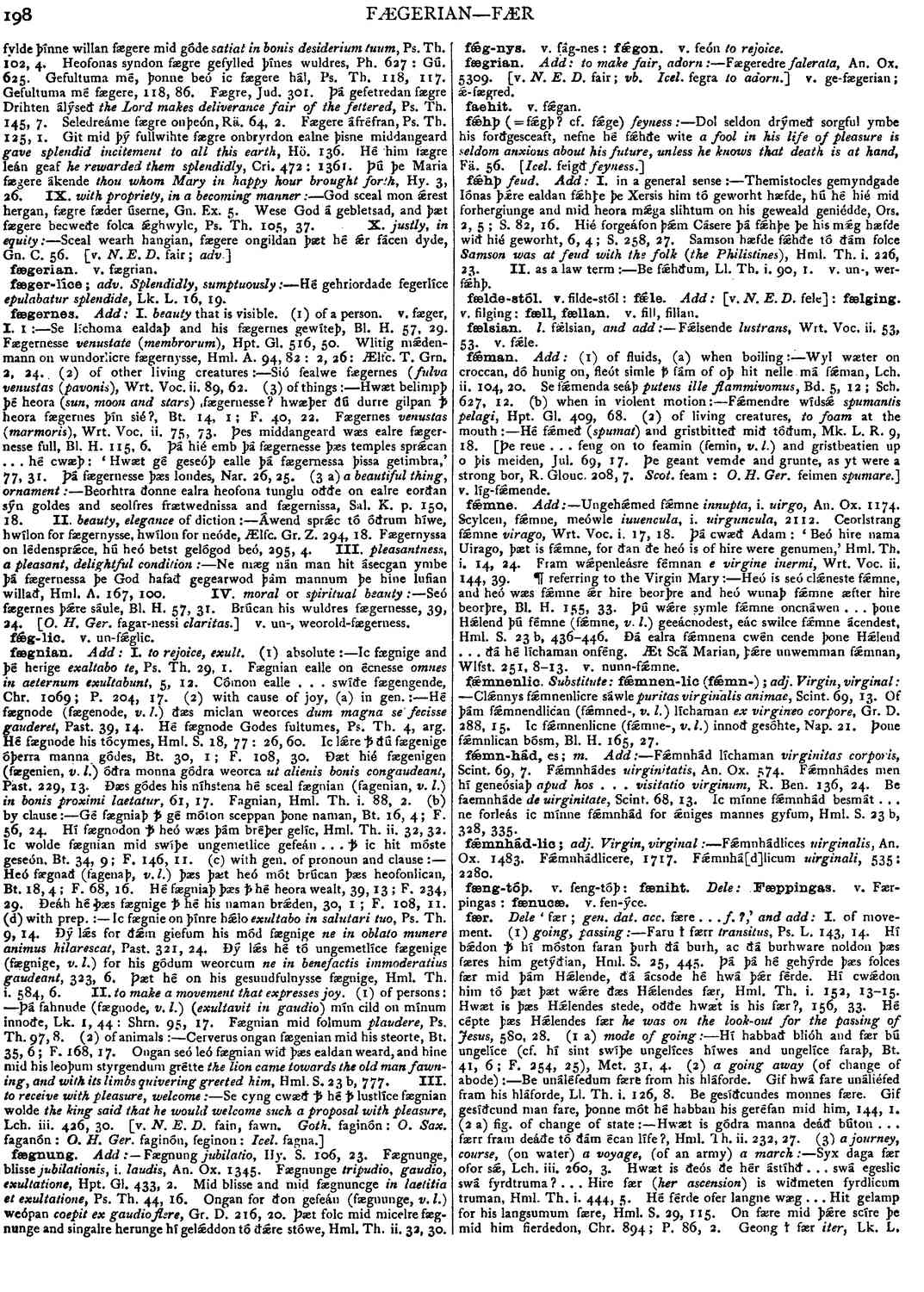fægnian
- verb [ weak ]
-
Ic fægnige and þé herige
exaltabo te,
- Ps. Th. 29, 1 .
-
Fægnian ealle on écnesse
omnes in aeternum exultabunt,
- 5, 12 .
-
Cómon ealle . . . swíðe fægengende,
- Chr. 1069 ;
- P. 204, 17.
-
Hé fægnode (fægenode, v. l.) ðæs miclan weorces
dum magna se fecisse gauderet,
- Past. 39, 14 .
-
Hé fægnode Godes fultumes,
- Ps. Th. 4, arg .
-
Hé fægnode his tócymes,
- Hml. S. 18, 77 :
- 26, 60 .
-
Ic lǽre ꝥ ðú fægenige óþerra manna gódes,
- Bt. 30, 1 ;
- F. 108, 30 .
-
Ðæt hié fægenigen (fægenien, v. l.) óðra monna gódra weorca
ut alienis bonis congaudeant,
- Past. 229, 13 .
-
Ðæs gódes his níhstena hé sceal fægnian (fagenian, v. l.)
in bonis proximi laetatur,
- 61, 17 .
-
Fagnian,
- Hml. Th. i. 88, 2 .
-
Gé fægniaþ ꝥ gé móton sceppan þone naman,
- Bt. 16, 4 ;
- F. 56, 24 .
-
Hí fægnodon ꝥ heó wæs þám bréþer gelíc,
- Hml. Th. ii. 32, 32 .
-
Ic wolde fægnian mid swíþe ungemetlice gefeán . . . ꝥ ic hit móste geseón.
- Bt. 34, 9 ;
- F. 146, 11 .
-
Heó fægnað (fagenaþ, v. l.) þæs þæt heó mót brúcan þæs heofonlican,
- Bt. 18, 4 ;
- F. 68, 16 .
-
Hé fægniaþ þæs ꝥ hé heora wealt,
- 39, 13 ;
- F. 234, 29 .
-
Ðeáh hé þæs fægnige ꝥ hé his naman brǽden,
- 30, 1 ;
- F. 108, 11 .
-
Ic fægnie on þínre hǽlo
exultabo in salutari tuo,
- Ps. Th. 9, 14 .
-
Ðý lǽs for ðǽm giefum his mód fægnige
ne in oblato munere animus hilarescat,
- Past. 321, 24 .
-
Ðý lǽs hé tó ungemetlíce fægenige (faegnige, v. l.) for his gódum weorcum
ne in benefactis immoderatius gaudeant,
- 323, 6 .
-
Þæt hé on his gesundfulnysse fægnige,
- Hml. Th. i. 584, 6 .
-
Þá fahnude (fægnode, v. l.)
(exultavit in gaudio)
mín cild on mínum innoðe,
- Lk. 1, 44 :
- Shrn. 95, 17 .
-
Fægnian mid folmum
plaudere,
- Ps. Th. 97, 8 .
-
Cerverus ongan fægenian mid his steorte,
- Bt. 35, 6 ;
- F. 168, 17.
-
Ongan seó leó fægnian wið þæs ealdan weard, and hine mid his leoþum styrgendum grétte
the lion came towards the old man fawning, and with its limbs quivering greeted him,
- Hml. S. 23 b, 777 .
-
Se cyng cwæð ꝥ hé ꝥ lustlíce fægnian wolde
the king said that he would welcome such a proposal with pleasure,
- Lch. iii. 426, 30 .
Bosworth, Joseph. “fægnian.” In An Anglo-Saxon Dictionary Online, edited by Thomas Northcote Toller, Christ Sean, and Ondřej Tichy. Prague: Faculty of Arts, Charles University, 2014. https://bosworthtoller.com/44346.
Checked: 1